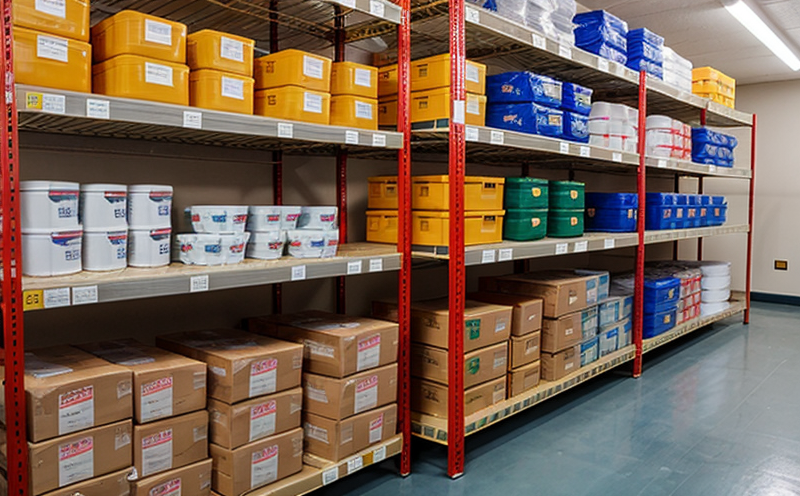Printing Ink Stability on Packaging Testing
The pharmaceutical industry demands stringent quality control measures to ensure that products meet regulatory standards and are safe for consumers. One critical aspect of this is ensuring that printing inks used on packaging remain stable over the product's shelf life. This stability testing is essential because changes in ink properties can affect print quality, color consistency, and even the adhesion between the ink and the packaging material. These factors can influence the efficacy, safety, and regulatory compliance of pharmaceutical products.
Printing ink stability on packaging testing involves a series of laboratory procedures designed to evaluate how printing inks behave under various environmental conditions that mimic real-world storage and transportation scenarios. This includes temperature cycling, humidity exposure, light exposure, and accelerated aging processes. The goal is to identify any changes in ink properties such as color fastness, adhesion strength, chemical composition, and resistance to degradation over time.
For pharmaceutical packaging, the stability of printing inks can significantly impact the overall product integrity. For instance, if an ink’s color or opacity changes, it could lead to incorrect dosage instructions or compromised aesthetic appeal. In extreme cases, issues with ink adhesion might cause labeling failures which are not only aesthetically displeasing but also raise serious concerns about patient safety.
The testing process typically involves several stages where inks are subjected to controlled environmental conditions that simulate different storage durations and temperatures. These tests help pharmaceutical companies understand the potential risks associated with prolonged exposure of printed labels or other packaging materials under adverse conditions. By conducting these stability studies early in the product development phase, manufacturers can make informed decisions about ink selection, formulation adjustments, and design modifications.
Standardization plays a crucial role in ensuring consistent results across different laboratories and facilities. International standards such as ISO 18167-2 for color measurement provide guidelines on how to accurately assess changes in ink properties over time. Similarly, ASTM D3945-10 covers the performance of printing inks used in pharmaceutical packaging, emphasizing the importance of adhering to these norms.
Pharmaceutical manufacturers rely heavily on reliable and reproducible testing methods when selecting inks for their products. Accurate evaluation ensures that all components contribute positively towards maintaining high standards throughout the supply chain. Properly conducted stability tests not only enhance product quality but also support compliance with stringent regulations governing pharmaceuticals globally.
Understanding how printing ink behaves under different conditions is vital for ensuring long-term viability and effectiveness of drug products. By addressing potential issues early in the manufacturing process, companies can prevent costly recalls later on while enhancing public trust in their brand.
Eurolab Advantages
At Eurolab, we offer comprehensive printing ink stability testing services specifically tailored to meet the stringent requirements of pharmaceutical packaging. Our state-of-the-art facilities equipped with advanced analytical instruments ensure precise and accurate results every time. Here are some key advantages our clients can expect:
- Accurate Results: Utilizing sophisticated equipment and experienced personnel guarantees reliable data that aligns perfectly with industry standards.
- Compliance Assurance: Ensures compliance with relevant international regulations like ISO 18167-2, ASTM D3945-10, and others ensuring your product remains up-to-date and meets all necessary criteria.
- In-depth Analysis: Beyond basic tests, we provide in-depth analyses to identify subtle changes that might otherwise go unnoticed by less thorough methods.
- Expertise: Our team comprises highly qualified professionals who have extensive experience working within the pharmaceutical sector, providing valuable insights and recommendations based on test outcomes.
- Efficiency: Streamlined processes reduce turnaround times without compromising quality, allowing you to stay ahead of deadlines crucial in competitive markets.
- Cost-effectiveness: By identifying issues early rather than later when problems become more pronounced, our services help minimize unnecessary expenses associated with rework or recall situations.
Choose Eurolab for your printing ink stability testing needs and experience the difference quality can make in ensuring product success and regulatory compliance.
Why Choose This Test
- Prevent Quality Issues: Ensuring that printing inks remain stable enhances overall product integrity, preventing issues such as color fading or adhesion failures.
- Meet Regulatory Standards: Compliance with international standards is critical for pharmaceutical companies. Stability testing helps ensure that your products meet these stringent requirements.
- Improve Product Quality: Early identification of potential problems allows for timely adjustments, thereby improving final product quality and reliability.
- Enhance Consumer Trust: Reliable packaging with consistent printing enhances consumer confidence in the brand and its commitment to safety standards.
- Reduce Risks: By understanding how inks behave under various conditions, you can mitigate risks associated with potential failures during storage or use.
- Sustainable Solutions: Our tests help identify sustainable printing solutions that are environmentally friendly yet effective in maintaining product quality over extended periods.
Choosing Eurolab for your printing ink stability testing ensures that you get accurate, reliable results supported by our comprehensive suite of services. Let us help you achieve excellence in every aspect of your pharmaceutical packaging processes.





